Answered step by step
Verified Expert Solution
Question
1 Approved Answer
1. Exculpatory clauses: A. can relieve a party from liability for wrongdoing no matter what the reason. B.are always illegal. C. are always enforced because
1. Exculpatory clauses: A. can relieve a party from liability for wrongdoing no matter what the reason. B.are always illegal. C. are always enforced because of freedom to contract. D. can never relieve a party from liability for any wrongdoing greater than negligence. 2. Which of the following will increase the chances that a covenant (agreement) not to compete clause will be enforced? A. none of these, as covenants not to compete are an illegal restriction on an individual's right to work. B. the covenant contains a "lifetime" restriction. C. the restriction is necessary to protect trade secrets. D. the restriction involves a geographical area larger than the area in which the employer does business. 3. Covenants (agreements) not to compete: A. are always enforced against individuals and businesses because they serve an important economic function. B. are always enforced against businesses. C. must have at a minimum reasonable limitations. D. are never enforced against individuals. 4. (True or False ) Food, clothing, and shelter are the only things that the courts have been willing to define as being "necessaries." 5. (True or false) While potentially enforceable, contracts that limit competition are disfavored by courts. 6. A person who is older than the age of majority may disaffirm a contract if: A. The other party is a minor who lied about his age B. None of these. C. The other party is an emancipated minor. D. The contract is for necessaries 7. (True or false) An exculpatory clause relieving a person from liability for her fraud will not be enforced. 8. If a covenant not to compete is too broad, a court will: A. shut the business down. B. adjust the clause to make it reasonable C. Choose either to strike the entire restriction, or adjust the clause to make it reasonable. D. strike the entire restriction 9. (True or false) Both Regulatory and Revenue raising licensing statutes are designed to protect the public. 10. ( True or false ) A minor normally is permitted to disaffirm a contract for the purchase of necessaries but remains liable for the reasonable value of the goods. Can you please give a brief explanation to help me studying for my final exam ! THANK YOU SO MUCH FOR THE HELP
Step by Step Solution
There are 3 Steps involved in it
Step: 1

Get Instant Access to Expert-Tailored Solutions
See step-by-step solutions with expert insights and AI powered tools for academic success
Step: 2

Step: 3

Ace Your Homework with AI
Get the answers you need in no time with our AI-driven, step-by-step assistance
Get Started


